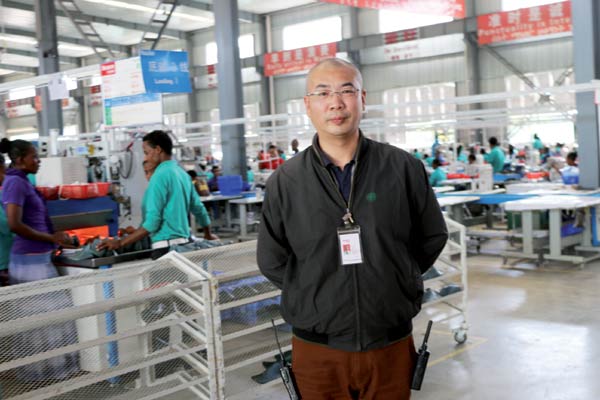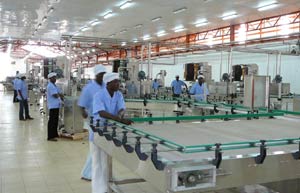 |
|
Jack Song, deputy general manager of Huajian International Shoe City (Ethiopia) Plc. CHEN WEIHUA/CHINA DAILY |
Operating from an office in downtown Addis, the fluent-English speaker has been given the pivotal job of handling negotiations between her company and the Ethiopian government, often working at ministerial level, on the new zone's development.
Huajian plans to pour $300 million into the new site over the next seven years, she says.
Back on a daily-operational level, Song says his daily priority is finding ways of improving productivity and quality at Huajian's current factory.
A typical Ethiopian worker is about 60-70 percent as productive as the equivalent Chinese, but he believes that can be increased to 70-80 percent, he says.
The company's top-end brands of shoes, such as those produced for Coach and Versace, are still being manufactured in China, and will remain so for a while yet, he says.
"Our operation here needs experience, and that means training over the long-term."
Esrael Etefa, a 24-year-old Ethiopian, is one of 89 local workers who were trained in Huajian's headquarters in the southern Chinese city of Dongguan in 2011, before production started in Ethiopia.
 |

|
"The work here is hard, but I like the environment because it teaches us how to overcome our challenges," Etefa says, in Chinese.
Natty Abebe has also been with Huajian since it started three years ago.
"The management treats us well and I have learned a lot here," says the 26-year-old assistant to the workshop manager, who has a degree in hotel management from the University of Addis Ababa.
Etefa and Abebe are exactly the types of highly qualified individuals Song says he wants to train and promote, meaning he can cut down on the number of relatively expensive Chinese still in managerial posts. His goal is to cut the Chinese total from the current 170 to 60.
The 43-year old Song came to Ethiopia in October after working for Huajian for 13 years, and for 20 years in the shoe industry.
Three times a week about 4:30 pm, he gathers his 200 Chinese and Ethiopian managers, in military formation outside the factory.
He then shares with them the latest developments and best practices in successful shoe production.
"We are always in a 'cadre-training' mode," he says with a smile.
Huajian still faces challenges in Ethiopia, such as inefficient customs clearance and poor infrastructure, as the country is still to benefit fully from its government's reforms and development planned to attract more foreign investors.
Rent in the Eastern Industry Zone, he says, is also expensive compared to China.
But while Ethiopia's labor costs are definitely an advantage, Song insists that does not mean huge profits.
As an original equipment manufacturer, Huajian does not have much say in deciding its products' sales prices, which are still set by its US and European customers, he says.
"It's the Western trading firms and their consumers who benefit most; the pressures on producers like us are still extremely high."
